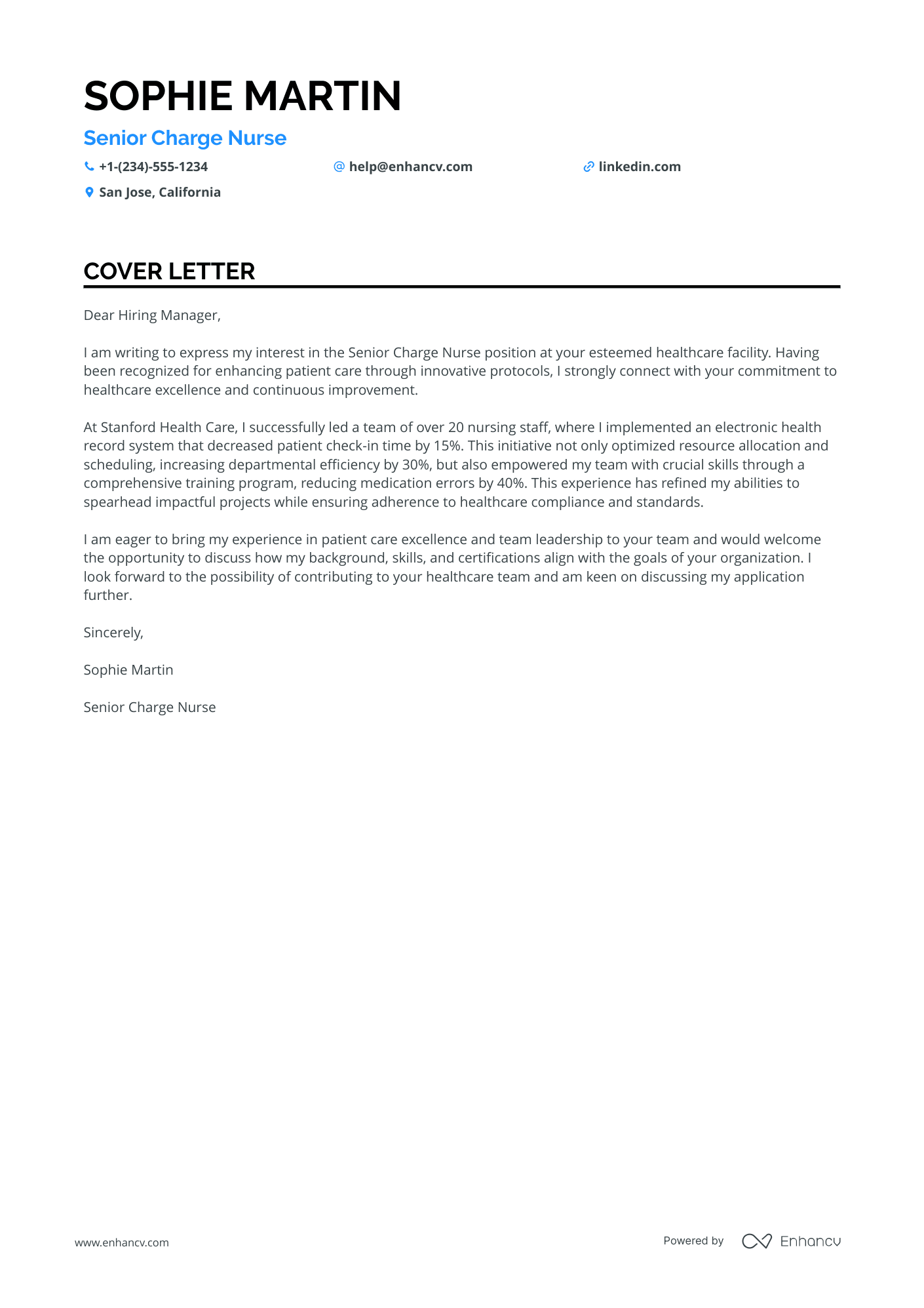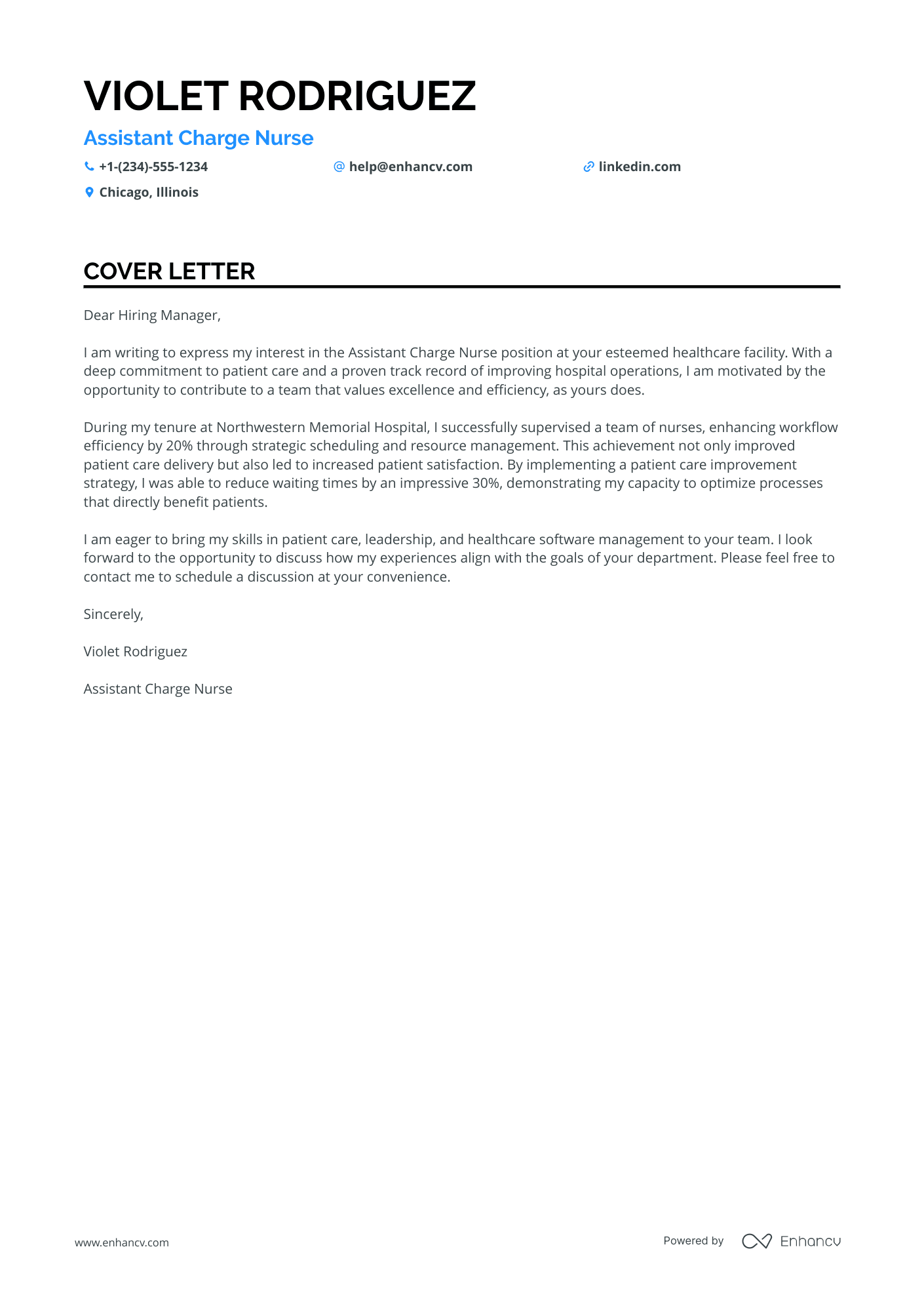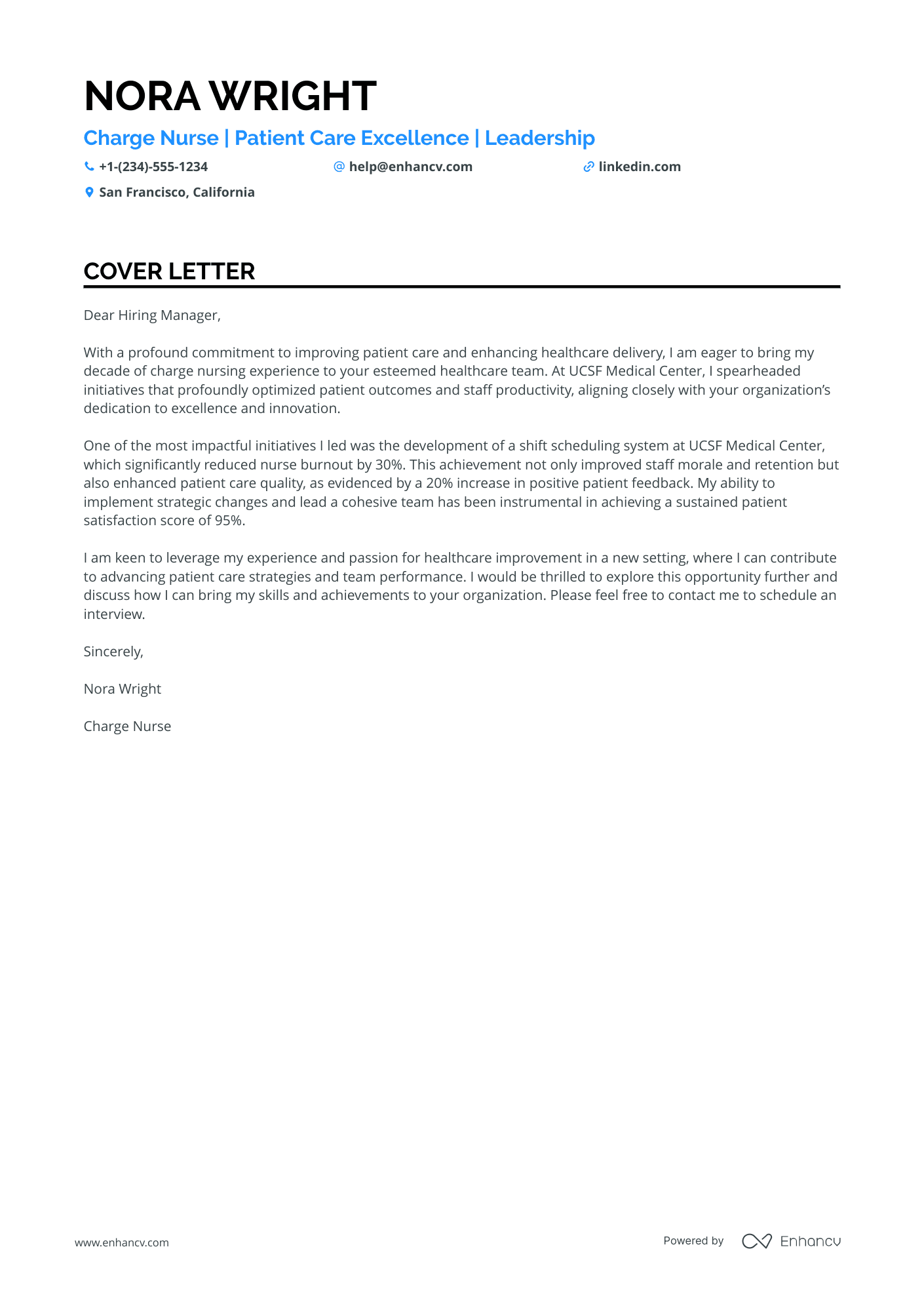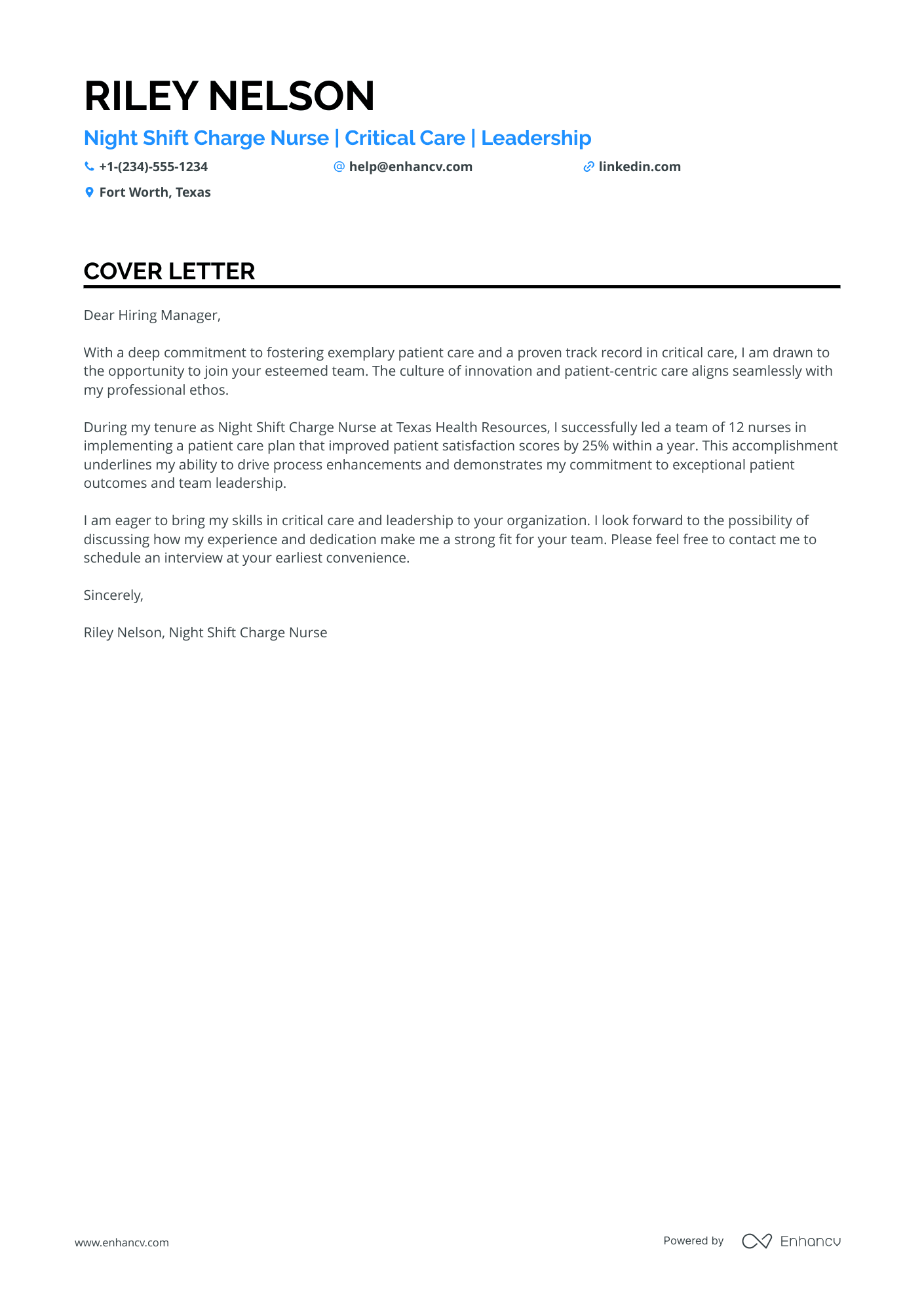As you step into the world of nursing leadership, crafting a compelling charge nurse cover letter can be a daunting hurdle. You've updated your resume, eager to apply, only to find the hurdle of a cover letter looming ahead. Your cover letter is not a resume echo; it's your stage to eloquently narrate your proudest professional accomplishment. Be wary of clichés and strive for genuine storytelling within a succinct, one-page document that captures your unique qualifications and passion.
- Making excellent use of job-winning real-life professional cover letters;
- Writing the first paragraphs of your charge nurse cover letter to get attention and connect with the recruiters - immediately;
- Single out your most noteworthy achievement (even if it's outside your career);
- Get a better understanding of what you must include in your charge nurse cover letter to land the job.
Let the power of Enhancv's AI work for you: create your charge nurse cover letter by uploading your resume.
If the charge nurse isn't exactly the one you're looking for we have a plethora of cover letter examples for jobs like this one:
Drop your resume here or choose a file.
PDF & DOCX only. Max 2MB file size.
Charge nurse cover letter example
LUNA THOMAS
Philadelphia, Pennsylvania
+1-(234)-555-1234
help@enhancv.com
- Highlighting measurable achievements, such as reducing medication errors by 45%, helps quantify the candidate's impact and demonstrates success in previous roles which is crucial for roles in healthcare management.
- Demonstrating leadership in quality improvement programs shows the ability to oversee vital initiatives, a skill essential for managing operations in healthcare settings.
- Expressing a desire to bring industry-recognized expertise indicates a level of competence and commitment, suggesting that the candidate is well-versed in industry standards and is dedicated to professional growth.
- Mentioning experience with compliance and quality assurance emphasizes the candidate's knowledge of crucial healthcare regulations and their aptitude for maintaining high-quality care standards.
Structuring and formatting your charge nurse cover letter
Here's what the structure of your charge nurse cover letter should include:
- Header (with your name, the position you're applying for, and the date);
- Salutation (or greeting);
- Introductory paragraph (or your opening statement);
- Body paragraph (or further proof of your experience);
- Closing paragraph (with a call to action);
- Signature (that is optional).
Use the same font for your charge nurse resume and cover letter - modern fonts like Lato and Rubik would help you stand out.
Your charge nurse cover letter should be single-spaced and have a one-inch margins - this format is automatically set up in our cover letter templates and our cover letter builder.
When submitting your cover letter, always ensure it's in PDF, as this format keeps the information intact (and the quality of your document stays the same).
On one final note - the Applicant Tracker System (ATS or the software that is sometimes used to initially assess your application) won't read your charge nurse cover letter.
Pressed for time? Use our free cover letter generator to turn your resume into a cover letter effortlessly.
The top sections on a charge nurse cover letter
- Header: This includes your contact information, the date, and the employer's contact information, establishing a professional format and making it easy for the recruiter to reach out to you.
- Greeting: A personalized greeting addressing the hiring manager by name demonstrates your attention to detail and professionalism, which are crucial for a charge nurse who must communicate effectively with staff and patients.
- Opening Paragraph: State your interest in the charge nurse position and briefly mention your current role and years of nursing experience to immediately establish your industry relevance and expertise.
- Body Sections: Highlight your leadership skills, ability to manage a nursing team, and experiences with patient care coordination, as these are essential attributes of a successful charge nurse.
- Closing Paragraph: Reiterate your enthusiasm for the role, your commitment to providing exceptional patient care, and your willingness to contribute positively to the facility, followed by a professional sign-off and your name.
Key qualities recruiters search for in a candidate’s cover letter
- Clinical expertise in nursing: This demonstrates the candidate’s solid foundation in the practical and theoretical aspects of nursing, which is vital for overseeing patient care and making informed decisions.
- Leadership and management experience: Being in charge requires the ability to lead and manage a team of nurses, ensuring efficient workflow and high-quality patient care.
- Excellent communication skills: A charge nurse must communicate effectively with staff, patients, and other healthcare professionals to coordinate care and manage the nursing team.
- Decision-making ability: Quick and accurate judgment is critical in emergency situations or when making day-to-day operational choices that affect patient outcomes.
- Conflict resolution skills: The charge nurse often mediates disputes and addresses interpersonal issues within the nursing staff, maintaining a harmonious work environment.
- Organizational and multitasking capabilities: The role involves juggling various responsibilities such as scheduling, resource allocation, and administrative tasks while maintaining high standards of care.
What matters most when tailoring your charge nurse cover letter salutation
Your charge nurse cover letter greeting should feel welcoming to recruiters.
Use their first name (e.g. "Dear Marshall" or "Dear Sara"), if you've previously been in touch with the hiring manager and are on a more friendly basis.
If this is the first time you're contacting the recruiters, start your charge nurse cover letter with:
- their last name (e.g. "Dear Ms. Ali" or "Dear Mr. Stevens") - look up who's the hiring manager for the role on social media or the company website;
- generalized greeting (e.g. "Dear HR Team") - just don't use "To whom it may concern" or "Dear Sir/Madam".
List of salutations you can use
- Dear Hiring Manager,
- Dear [Hospital or Clinic Name] Recruiting Team,
- Dear Director of Nursing,
- Dear [Specific Department] Team,
- Dear [Mr./Ms./Dr.] [Last Name],
- Dear Healthcare Administrator,
The charge nurse cover letter introduction: focusing on your unique value, with a creative twist
You are not the only one wondering how to start your charge nurse cover letter. Those first two sentences introduce your profile and should be memorable.
No pressure.
When beginning your charge nurse cover letter, immediately point out the unique value of working with you. In other words, what you promise to bring to the role by using your past track record of success.
Start your charge nurse cover letter with a creative twist by telling a joke or stating something relatable. Select this type of introduction only if it aligns with the company culture.
What comes next: your charge nurse cover letter middle paragraphs
In the next three to six paragraphs (or the body of your charge nurse cover letter) you have to prove your unique value.
Most candidates tend to mess up at this stage. They tend to just copy-paste information from their resume.
That's one big no-no.
Remember that when writing your charge nurse cover letter, it has to be personalized. And, your ultimate aim is to catch the recruiter's eye.
So, look back on key job requirements and write down a list that includes the ones you cover.
Next, select just one key achievement from your professional (or personal) history that meets those advert keywords.
Narrate a story around how you've grown your skill set and knowledge. Also, aim to show the unique understanding or soft skills you bring about, thanks to your past success.
Final words: writing your charge nurse cover letter closing paragraph
The final paragraph of your charge nurse cover letter allows you that one final chance to make a great first impression.
Instead of going straight to the "sincerely yours" ending, you can back up your skills with a promise of:
- how you see yourself growing into the role;
- the unique skills you'd bring to the organization.
Whatever you choose, always be specific (and remember to uphold your promise, once you land the role).
If this option doesn't seem that appealing to you, close off your charge nurse cover letter with a follow-up request.
You could even provide your availability for interviews so that the recruiters would be able to easily arrange your first meeting.
What to write on your charge nurse cover letter, when you have zero experience
The best advice for candidates, writing their charge nurse cover letters with no experience, is this - be honest.
If you have no past professional roles in your portfolio, focus recruiters' attention on your strengths - like your unique, transferrable skill set (gained as a result of your whole life), backed up by one key achievement.
Or, maybe you dream big and have huge motivation to join the company. Use your charge nurse cover letter to describe your career ambition - that one that keeps you up at night, dreaming about your future.
Finally, always ensure you've answered why employers should hire precisely you and how your skills would benefit their organization.
Key takeaways
Winning at your job application game starts with a clear and concise charge nurse cover letter that:
- Has single-spaced paragraphs, is wrapped in a one-inch margin, and uses the same font as the charge nurse resume;
- Is personalized to the recruiter (using their name in the greeting) and the role (focusing on your one key achievement that answers job requirements);
- Includes an introduction that helps you stand out and show what value you'd bring to the company;
- Substitutes your lack of experience with an outside-of-work success, that has taught you valuable skills;
- Ends with a call for follow-up or hints at how you'd improve the organization, team, or role.
Charge Nurse cover letter examples
By Experience
Senior Charge Nurse
- Specific Achievements: The cover letter highlights a concrete achievement of implementing an electronic health record system that resulted in a tangible improvement—decreasing patient check-in time by 15%—demonstrating problem-solving skills and direct impact on service efficiency.
- Leadership and Team Management: Emphasizing the successful leadership of a team of over 20 nursing staff showcases strong leadership abilities, a crucial aspect for a Senior Charge Nurse responsible for supervising and guiding other healthcare professionals.
- Commitment to Patient Care and Safety: By mentioning the reduction of medication errors by 40%, the letter underscores a dedication to patient safety—a critical area of focus in nursing roles and a key concern for healthcare facilities.
- Alignment with Organizational Values: Making a connection between personal achievements and the prospective employer's focus on healthcare excellence and continuous improvement aligns the candidate’s values and experiences with the organization’s mission.
By Role
Assistant Charge Nurse
- Quantifying Achievements: By showcasing specific improvements, such as a 20% increase in workflow efficiency and a 30% reduction in waiting times, the candidate effectively demonstrates their impact and capability to optimize healthcare operations.
- Leadership Experience: Highlighting the experience in supervising a team underscores the candidate's ability to lead and manage, which is crucial for an Assistant Charge Nurse responsible for overseeing other nurses.
- Commitment to Patient Care: The letter emphasizes a deep commitment to patient care, aligning with the role's responsibility to ensure high standards of treatment and satisfaction.
- Alignment with Organization's Goals: Expressing admiration for the hiring institution and aligning personal achievements with the facility's values and goals reinforces the candidate's suitability and enthusiasm for the position.
Day Shift Charge Nurse
- Quantifiable Achievements: Mentioning specific figures, like the 30% reduction in nurse burnout and 20% increase in positive patient feedback, provides clear, measurable evidence of the candidate’s impact.
- Alignment with Organizational Values: Highlighting alignment with the healthcare organization’s commitment to excellence and innovation to demonstrate a strong fit with the potential employer’s culture and goals.
- Leadership and Strategic Implementation: Describing previous leadership roles and the successful implementation of key initiatives showcases the candidate’s ability to lead teams and drive improvements in patient care.
- Personalization and Genuine Interest: Expressing eagerness to contribute to the prospective employer’s mission and a willingness to discuss further opportunities reinforces genuine interest in the position.
Night Shift Charge Nurse
- Highlighting Achievements: The cover letter effectively emphasizes a quantifiable achievement (improving patient satisfaction scores by 25%), showcasing the candidate’s impact in a tangible manner.
- Leadership Skills: The letter underscores leadership capability by mentioning the experience of leading a team, which is crucial for a charge nurse role.
- Alignment with Organizational Values: The candidate expresses alignment with the organization's culture of innovation and patient-centric care, demonstrating thoughtful research and personal alignment with the potential employer’s values.
- Focus on Communication: The open-ended invitation to discuss further in an interview reflects strong communication skills and eagerness, important for nursing roles that require collaboration and continuous engagement.













